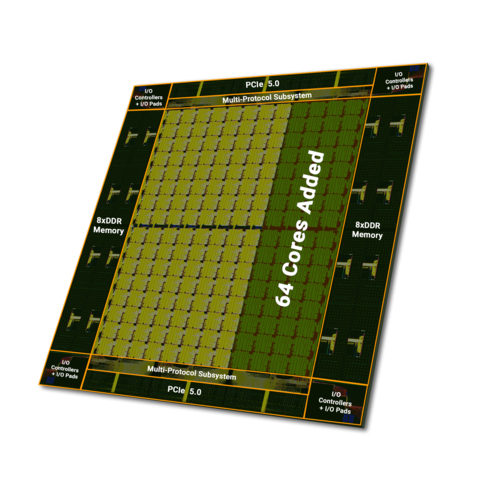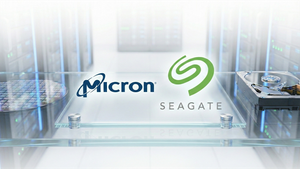Tachyum® today announced that new EDA tools, utilized during the physical design phase of the Prodigy® Universal Processor, have allowed the company to achieve significantly better results with chip specifications than previously anticipated, after the successful change in physical design tools – including an increase in the number of Prodigy cores to 192.
This press release features multimedia. View the full release here: https://www.businesswire.com/news/home/20230815532482/en/

192 core Prodigy Processor Tachyum Chip CPU TPU GPU AI Supercomputing processor (Photo: Business Wire)
After RTL design coding, Tachyum began work on completing the physical design (the actual placement of transistors and wires) for Prodigy. After the Prodigy design team had to replace IPs, it also had to replace RTL simulation and physical design tools. Armed with a new set of EDA tools, Tachyum was able to optimize settings and options that increased the number of cores by 50 percent, and SERDES from 64 to 96 on each chip. Die size grew minimally, from 500mm2 to 600mm2 to accommodate improved physical capabilities. While Tachyum could add more of its very efficient cores and still fit into the 858mm2 reticle limit, these cores would be memory bandwidth limited, even with 16 DDR5 controllers running in excess of 7200MT/s. Tachyum cores have much higher performance than any other processor cores.
Other improvements realized during the physical design stage are:
- Increase of the chip L2/L3 cache from 128MB to 192MB
- Support of DDR5 7200 memory in addition to DDR5 6400
- More speed with 1 DIMM per channel
- Larger package accommodates additional 32 serial links and as many as 32 DIMMs connected to a single Prodigy chip
“At every step of the process in bringing Prodigy to market, our innovation allows us to push beyond the limits of traditional design and continue to exceed even our lofty design goals,” said Dr. Radoslav Danilak, founder and CEO of Tachyum. “We have achieved better results and timing with our new EDA PD tools. They are so effective that we wish we had used them from the beginning of the process but as the saying goes, ‘Better now than never.’ While we did not have any choice but to change EDA tools, our physical design (PD) team worked hard to redo physical design and optimizations with the new set of PD tools, as we approach volume-level production.”
As a universal processor, the patented Prodigy architecture enables it to switch seamlessly and dynamically from normal CPU tasks to AI/ML workloads, so it delivers high AI/ML performance in both training and inference. AI/ML is increasingly important in the banking industry, and used to identify fraud and cyberattacks before serious financial damage can be done.
Prodigy delivers unprecedented data center performance, power, and economics, reducing CAPEX and OPEX significantly. Because of its utility for both high-performance and line-of-business applications, Prodigy-powered data center servers can seamlessly and dynamically switch between workloads, eliminating the need for expensive dedicated AI hardware and dramatically increasing server utilization. Tachyum's Prodigy delivers performance up to 4x that of the highest performing x86 processors (for cloud workloads) and up to 3x that of the highest performing GPU for HPC and 6x for AI applications.
With the achievement of this latest Prodigy milestone, Tachyum’s next steps are to complete the substrate package and socket design to accommodate more SERDES lines. Delivery of the first Prodigy high-performance processors remains on track by the end of the year.
Follow Tachyum
https://twitter.com/tachyum
https://www.linkedin.com/company/tachyum
https://www.facebook.com/Tachyum/
About Tachyum
Tachyum is transforming the economics of AI, HPC, public and private cloud workloads with Prodigy, the world’s first Universal Processor. Prodigy unifies the functionality of a CPU, a GPGPU, and a TPU in a single processor that delivers industry-leading performance, cost, and power efficiency for both specialty and general-purpose computing. When hyperscale data centers are provisioned with Prodigy, all AI, HPC, and general-purpose applications can run on the same infrastructure, saving companies billions of dollars in hardware, footprint, and operational expenses. As global data center emissions contribute to a changing climate, and consume more than four percent of the world’s electricity—projected to be 10 percent by 2030—the ultra-low power Prodigy Universal Processor is a potential breakthrough for satisfying the world’s appetite for computing at a lower environmental cost. Prodigy, now in its final stages of testing and integration before volume manufacturing, is being adopted in prototype form by a rapidly growing customer base, and robust purchase orders signal a likely IPO in late 2024. Tachyum has offices in the United States and Slovakia. For more information, visit https://www.tachyum.com/.
View source version on businesswire.com: https://www.businesswire.com/news/home/20230815532482/en/
Contacts
Mark Smith
JPR Communications
818-398-1424
marks@jprcom.com





